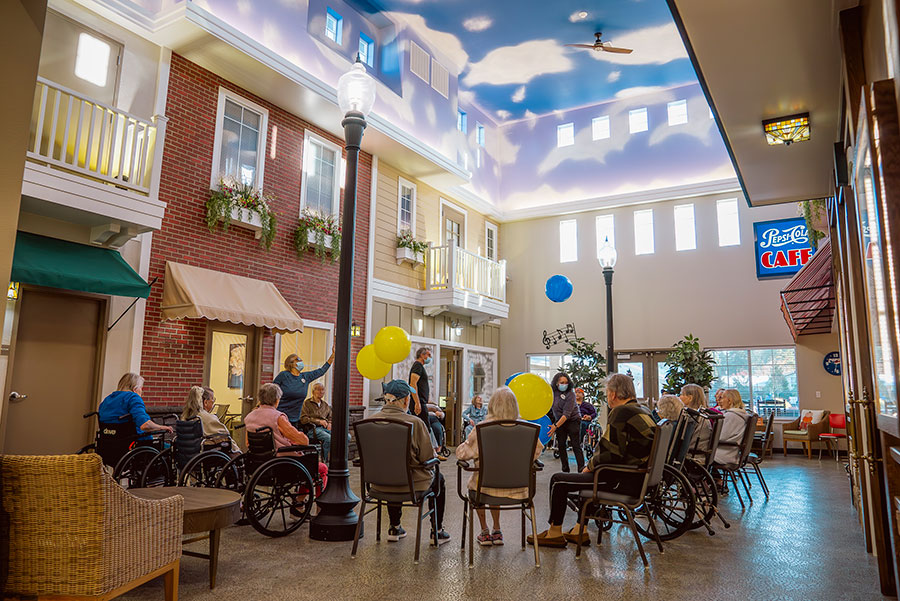Exploring the Relevance of Memory Care Solutions in Small Memory Treatment Houses
Memory treatment services play a crucial function in improving the lives of individuals with cognitive impairments. In small memory treatment homes, the focus changes to personalized treatment tailored to each resident's one-of-a-kind requirements. These intimate settings cultivate much deeper links and a supportive community. However, the concern continues to be: just how do these settings specifically add to the emotional well-being of both homeowners and their families? Recognizing this dynamic exposes the real value of specialized memory care.
Understanding Memory Care and Its Significance
Memory treatment is an essential component in addressing the unique demands of people with cognitive problems, such as dementia and Alzheimer's disease. This specialized form of care concentrates on creating a supportive and secure setting customized to the obstacles dealt with by these individuals. Memory care facilities use skilled personnel who comprehend the complexities of cognitive decrease, using personalized treatment that promotes self-respect and respect.Activities and routines are developed to promote memory retention and cognitive function while ensuring safety and security. In addition, memory care emphasizes social interaction, which can ease feelings of isolation and improve psychological wellness. By fostering a structured setting, individuals can browse their lives with more confidence. Recognizing the significance of memory treatment discloses its function in enhancing top quality of life, making it possible for individuals to preserve as much independence as feasible while getting the assistance they require.

The Advantages of Smaller Memory Treatment Homes
Smaller sized memory care homes use an even more intimate setup that can significantly improve the quality of take care of locals. With less homeowners, team member can construct stronger partnerships, fostering trust fund and emotional links. This customized interest typically brings about improved interaction, making it much easier for caregivers to recognize and satisfy the unique demands of each homeowner. Additionally, smaller sized environments commonly decrease stress factors and distractions, advertising a relaxing atmosphere helpful to memory retention and psychological health. The design of smaller sized homes typically motivates socialization amongst citizens, permitting purposeful communications that can battle feelings of isolation. These homes can adjust more quickly to modifications in care requirements, guaranteeing that residents receive timely support - small memory carehomes Charlotte. Generally, the customized focus, lowered stress and anxiety, and boosted social possibilities found in smaller memory care homes develop a nurturing setting that supports both cognitive function and psychological wellness
Personalized Care Plans for Individual Needs
Customized treatment strategies are vital in addressing the one-of-a-kind needs of individuals in memory care. These plans often consist of customized support approaches that boost daily living and promote health. Additionally, customized task involvement helps citizens get in touch with their passions, fostering a sense of objective and pleasure.
Tailored Support Techniques
Understanding the special demands of each individual is essential when creating customized support methods in memory care services. These approaches include creating individualized treatment strategies that deal with the certain demands, choices, and capabilities of residents. By evaluating cognitive feature, psychological wellness, and physical health and wellness, caregivers can create reliable treatments that advertise comfort and self-reliance - small memory carehomes Charlotte. This customized technique assurances that each resident obtains suitable support, improving their lifestyle. Routine examinations and adjustments to these strategies are crucial, as they allow caretakers to respond proactively to changing needs. Furthermore, involving relative in the planning procedure cultivates a collaborative atmosphere, enhancing the assistance network for individuals with memory difficulties. Inevitably, customized support approaches are vital for providing compassionate and efficient memory care
Individualized Task Engagement
Developing meaningful interaction through customized tasks is necessary in memory treatment solutions. Memory care homes focus on individualized treatment plans that satisfy the special requirements and choices of each local. These strategies frequently include activities customized to homeowners' interests, abilities, and cognitive degrees, enhancing their sense of purpose and dignity. By integrating familiar routines, leisure activities, and social communications, caregivers can promote cognitive function and emotional well-being. Personalized activity interaction not just fosters an encouraging environment yet likewise encourages locals to maintain their self-reliance. The energetic participation in these tailored activities can bring about enhanced state of mind and minimized stress and anxiety, reinforcing the value of an all natural approach in memory care that recognizes each person's journey and special experiences.
Producing an Encouraging Community Environment
While promoting an encouraging community environment is vital for those with memory treatment demands, it requires intentional style and thoughtful interaction. Producing such an environment includes a mix of physical room and social connections. Small memory treatment homes can profit substantially from designs that motivate social interaction, such as open usual areas and comfy celebration areas. These styles promote a sense of belonging and safety for residents.Moreover, personnel participants play an important role in growing this environment. Training caretakers to prioritize empathy and energetic listening cultivates and improves relationships trust. On top of that, involving households in treatment strategies and community activities can reinforce bonds and produce a network of assistance.
Enhancing Social Interaction and Activities
Efficient social engagement and activities are crucial for improving the health of residents in memory treatment homes. These interactions not just promote a sense of belonging however additionally stimulate cognitive functions, which can favorably impact memory retention. Tiny memory treatment homes typically offer individualized programs customized to the unique rate of interests and capabilities of each citizen, permitting for more effective and significant engagement.Activities such as art therapy, songs sessions, and team games motivate locals to attach with one an additional, promoting relationships and minimizing feelings of isolation. In addition, incorporating outside activities, such as horticulture or nature strolls, can boost state of mind and total health.These improving experiences help citizens maintain a sense of objective and joy in their lives. By producing an environment that focuses on social communication, small memory treatment homes considerably contribute to the mental and emotional well-being of their locals, ensuring they really feel valued and supported in their trip.
Sustaining Households Via the Journey
As families browse the difficulties of looking after a liked one with memory impairment, the support provided by tiny memory care homes ends up being essential. small memory carehomes Charlotte. These homes provide not just specific treatment for locals however also beneficial resources for family members. By promoting a collaborative setting, little memory care homes motivate open interaction, allowing family members to reveal issues and share experiences.Support groups and academic workshops are frequently readily available, equipping families with expertise and techniques to take care of the intricacies of memory loss. Such efforts aid lower sensations of seclusion, as families attach with others encountering similar situations.Moreover, tiny memory care homes typically give tailored updates on homeowners' well-being, easing family members' fears and assisting them really feel entailed in their liked one's every day life. This all natural strategy to sustain not just improves the top quality of care for citizens but likewise empowers family members throughout their psychological journey
The Influence of Specialized Personnel Training on Treatment High Quality
In small memory care homes, the quality of treatment is profoundly affected by the training and experience of the team. Specialized training equips caretakers with crucial skills to comprehend and attend to the distinct requirements of locals with memory impairments. Homepage Expertise of dementia-related behaviors, effective interaction methods, and person-centered care strategies enhances the ability of staff to create an encouraging environment.Moreover, experienced team are better prepared to manage challenging situations, lowering the chance of conflicts and guaranteeing a calmer atmosphere. This training cultivates a much deeper emotional connection between citizens and caretakers, promoting trust and boosting overall well-being. In addition, specialized training can cause higher task satisfaction amongst caretakers, lowering turn over prices and giving connection of care for resource citizens. Inevitably, the investment in team education significantly raises the requirement of care, which is vital for boosting the top quality of life for individuals in tiny memory treatment homes.

Regularly Asked Inquiries
How Do I Choose the Right Memory Treatment Home for My Loved One?
Choosing the ideal memory treatment home involves reviewing individual requirements, visiting centers, reviewing personnel experience, understanding care choices, considering location, contrasting expenses, and seeking suggestions. Each variable plays a vital duty in making sure optimal care.
What Is the Price Distinction Between Big and tiny Memory Treatment Facilities?
The cost difference between large and little memory treatment facilities can vary substantially. Usually, little homes may offer more personalized care at a higher per-person rate, while bigger centers commonly give extra services at a lower overall price.
Exactly How Frequently Can Families See Their Enjoyed Ones in Memory Care Residences?
Family members can generally visit their liked ones in memory care homes as frequently as desired, with many facilities encouraging regular brows through to maintain links and support psychological well-being, though particular policies might vary by home.
What Specific Activities Are Used in Small Memory Treatment Residences?
Little memory care homes commonly offer activities like crafts and arts, music treatment, gardening, workout courses, and cognitive games. These tasks are designed to involve locals, stimulate their minds, and promote social interaction among them.
Are There Any Type Of Age Restrictions for Locals in Memory Treatment Facilities?
Age limitations for homeowners in memory care centers usually differ by location and individual facility plans. Typically, these homes satisfy older adults, usually calling for homeowners to be at the very least 55 or 60 years old. In little memory treatment homes, the emphasis changes to personalized treatment tailored to each homeowner's distinct needs. Memory treatment centers utilize skilled personnel that comprehend the intricacies of article source cognitive decline, supplying personalized care that advertises dignity and respect.Activities and regimens are developed to promote memory retention and cognitive function while making certain safety and safety and security. Smaller memory care homes supply an even more intimate setup that can substantially improve the quality of care for homeowners. Memory care homes prioritize customized treatment plans that cater to the distinct requirements and choices of each resident. As family members navigate the difficulties of caring for a loved one with memory disability, the support provided by little memory care homes comes to be vital.